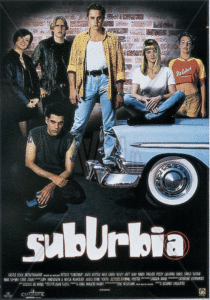Suburbia and the Linklater-verse
By Ali Bhutto | Movies | Published 7 years ago

Characters, lives and stories overlap in the Linklater-verse – the universe of Richard Linklater films. Boyhood leads to a Dazed and Confused young adulthood, where Everybody Wants Some of the good stuff. This period is followed by experiences in the darker underbelly of Suburbia and a glimpse into countercultures and the lives of Slackers. Some fall in love Before Sunrise, decide to meet again Before Sunset and can still be seen together Before Midnight. Others reunite in middle-age to keep The Last Flag Flying.
Mason, a high school graduate with a creative streak, drives to college in one of the iconic final scenes of Boyhood (2014). Everybody Wants Some (2016) picks up from where Boyhood left off, with its protagonist Jake, arriving at college as a freshman. Except Jake is an athlete, not an artist. He lies at the other end of the social spectrum. Real life, however, its seldom black and white. And this is what Linklater captures best. Both characters represent the two sides and two different phases of the director’s life.
The popular culture of the early 1980s drove Linklater underground. After a year-and-a half in college, as fate would have it, he found himself pursuing the arts, as opposed to varsity sports. During this phase, he embraced the canon of Russian and other literature, as well as punk culture. We only get a glimpse of this in the character of Justin – Jake’s former highschool baseball teammate-turned-punk – in Everybody Wants Some. But a more complete portrait of the artist as a young man can be found in one of Linklater’s older films. Suburbia (1996) is the director’s lesser-known gem, loosely based on a play by Eric Bogosian.
It is, arguably, the only rendition of that phase of Linklater’s life in which he turned to the underground and embraced literature and film. While Slacker (1991) provides a wider picture of the counterculture and environment in Austin during the recession of the mid-1980s, it is Suburbia that portrays, through some of its characters, the director’s personal experiences and mindset.
Set in the dreary suburbs of smalltown America, the film follows a group of twenty-somethings as they navigate their way through a single night. Suburbia isn’t laced with the glamour or the memorable humour of some of its counterparts in the Linklater-verse. Instead, it deliberately depicts a social dystopia. And like all Linklater films, it is frighteningly realistic.
Jeff (Giovanni Ribisi) may be taking a community college course while working a menial job, but this is not who he is. He lives in a pop-up tent in his parents garage, amidst books and an ashtray full of cigarette butts. In this small personal space, which symbolises his independence, he tries to pen down his thoughts and ideas. In the evening, he makes his way to ‘the corner’ – a nondescript spot located behind a gas station – where a small group of his friends hang out regularly.
The corner and its inhabitants form a sandbox world in the same vein as the island in William Golding’s novel, Lord of the Flies, which explores the social dynamics of a group of children.
The characters on the corner too, represent a cross-section of society. Jeff’s girlfriend Suze (Amie Carey) is an aspiring artist who longs for the glamour of New York’s art life and has plans to move there. When Pony (Jayce Bartok), a former classmate who made it big as a mainstream musician, pays his old crew a visit, he creates ripples in their little world. Jeff isn’t keen on the fame that Pony has attained and that Suze wishes she had. He wants to “break new ground,” through his writing, reflections and philosophical musings.
True to Linklater’s style, the film does not have a plot in the traditional sense. Instead, it chooses to focus on identity, the depth of its characters and the relations between them. Pony seduces Suze over the course of the night, eventually winning her over.
In an interview with Collider, Linklater spoke of his idea for a possible third instalment to Dazed and Confused and Everybody Wants Some. The potential follow-up would be an in-depth portrayal of his personal experiences in the underground culture of the mid-80s, which he describes as “apocalyptic and dark, but fun.”
The writer is a staffer at Newsline Magazine. His website is at: www.alibhutto.com


